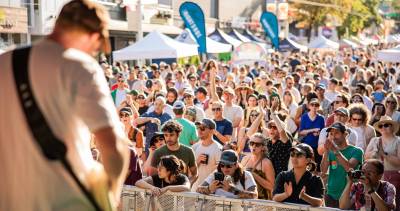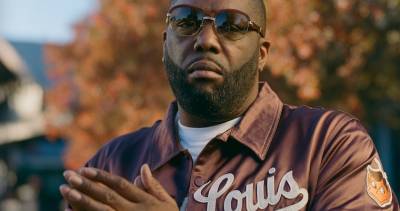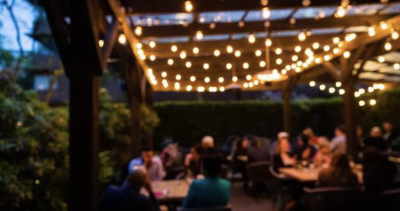Protesters mourn end of nonclinical treatment services at Rainier Hotel
Residents from the Rainier Hotel and their supporters walked 10 km from the Downtown Eastside to B.C. Premier Christy Clark’s office in Point Grey Tuesday (December 18) as part of an ongoing protest over the end of funding for aspects of the building's treatment program for women.
People carrying banners and mock coffins to symbolize the end of the program as it has existed for the last four years walked down West Broadway, past B.C. Health Minister Margaret MacDiarmid’s office.
Mark Townsend, the director of the Portland Hotel Society, told the Straight that federal funding has run out for the residential treatment program at the hotel it operates on Carrall Street. The services for women in transition from detox were covered through $5 million in one-time operational funding from Health Canada.
Without that funding, Townsend said the facility is losing some of the important supports it provided to residents. The society wants to see Vancouver Coastal Health, which has been funding clinical aspects of the addiction treatment program, take over operational costs.
“On the 28th of November, they came to explain to the women that lots of the things they rely on, like the vocational training and the mental-health workers, would be gone, and some of the services will still come in…but a reduced amount of time…basically turning it into an SRO,” he said.
According to Vancouver Coastal Health spokesperson Anna Marie D’Angelo, the local health authority never funded non-clinical services at the hotel, and it's outside of its mandate to replace the federal funding for those programs. VCH is currently in a “transition phase” of providing in-reach health care at the site into January, when it plans to add a psychiatrist and mental health worker to those services.
“We’re saying the main drivers that have benefited the women are the stable housing [and] the health-care services,” D’Angelo said in a phone interview. “We’re not saying that those other pieces aren’t valuable, or that the clients didn’t benefit with them - I’m sure that they are. But it’s not something that we support with our health-care dollars.”
Townsend argued that some of the other supports that were available for women as part of the program, such as someone to go with them outside if they were feeling like they might use, were “clinical interventions”.
Some of the other programs at the Rainier included a grief and loss group, a writing group, recreational therapy, art therapy, and yoga, he said.
Brenda Grealis, a resident at the Rainier Hotel for the past year, said she moved into the building about a year ago after she was living on the street. She’s now working and is living in one of the self-contained units on the third floor of the hotel.
“A year ago, I couldn’t put that together in any way,” she told the Straight.
She explained one of the programs she has participated in at the Rainier, called Seeking Safety, is focused on how women can “take care of themselves in dangerous situations”.
According to the Canadian Union of Public Employees, eight mental health and addiction worker positions will be lost at the facility.
D'Angelo said a clinical staff member will be on site at the Rainier 24 hours a day as part of Vancouver Coastal Health’s services at the building.















Comments
1 Comments
Rick in Richmond
Dec 19, 2012 at 12:33pm
Coastal Health gives VANDU $250,000 a year.
Why not take the quarter-million wasted on VANDU and spend it on the women at the Rainier? At least they want to change their lives.